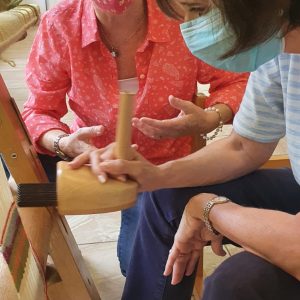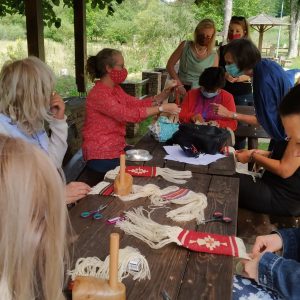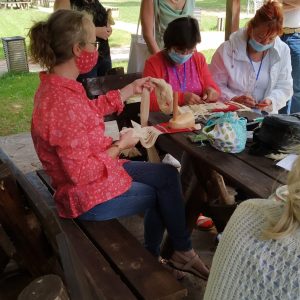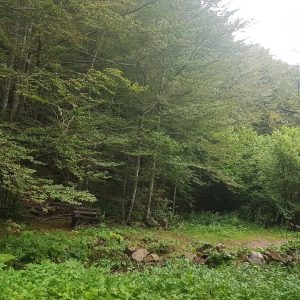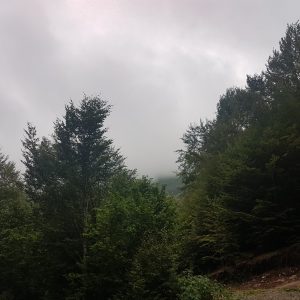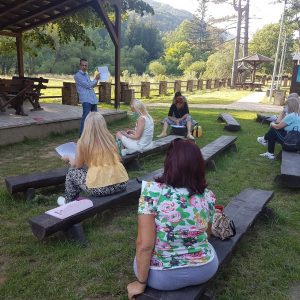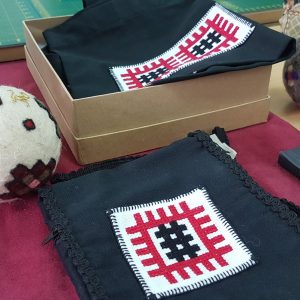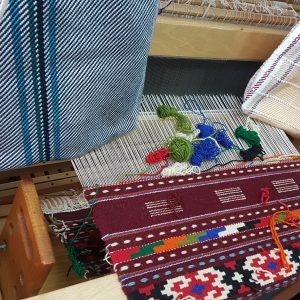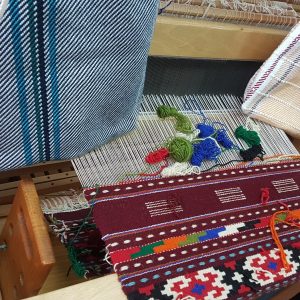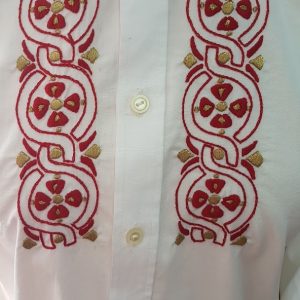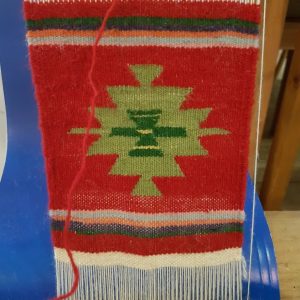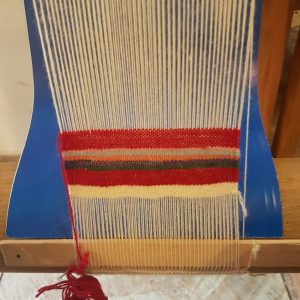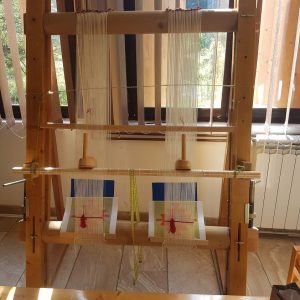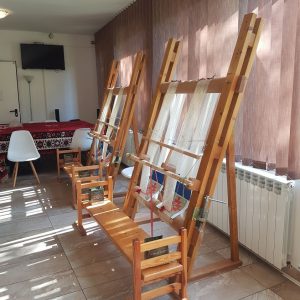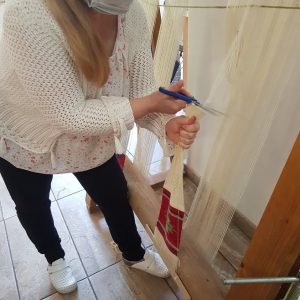The Warp and The Weft
I left Belgrade last week for a part of Serbia located in the southeast, right on the Bulgarian border. By myself. I just pointed the jeep in the direction of a city called Pirot, followed the GPS for about 3 hours, then followed someone else’s car for another hour (along a winding road I would never have navigated myself because once I left the outskirts of Pirot I had no signal and absolutely no sense of direction) to the village of Dojkinci (pronounced Doykintsi) and found myself cut off from the world of wifi by a wall of mountains and a ceiling of clouds.
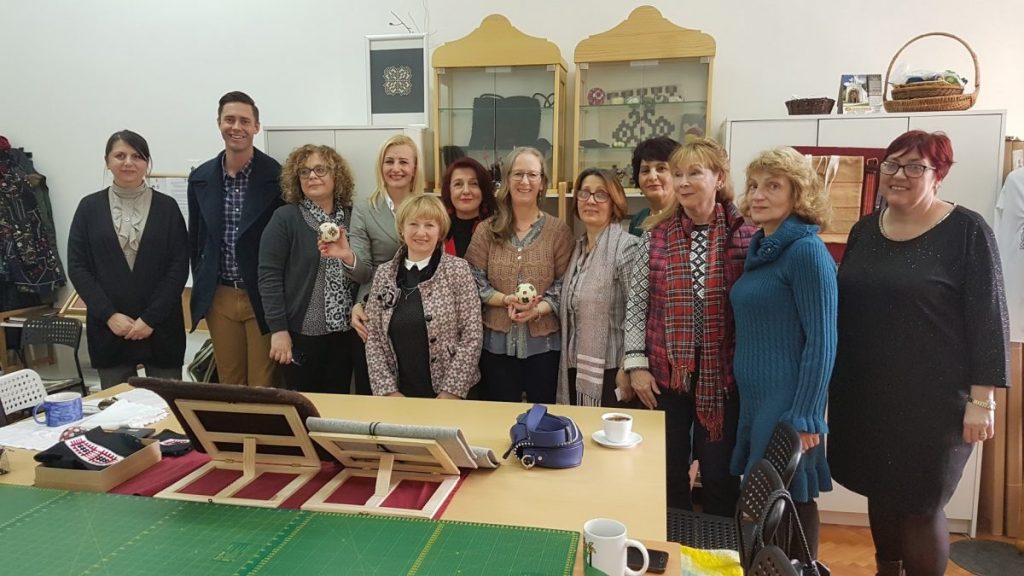
I could write a book about the four days I spent there.
Perhaps that’s why I have been back for almost a week already and the task of writing about my experiences in Stara Planina (Old Mountain) has been so daunting that I’ve procrastinated more than usual. But now I’m finding that I can’t settle to anything else until I put pen to paper, so to speak, and so here I am. And who knows what will come out in the words? Maybe it will be a short, wandering, disorganized piece just to get my thoughts on paper and I will rely on photos to fill in the gaps; with a promise of further exploration later on. Or perhaps it will be a long, winding, never-ending descriptive piece that you will give up on half-way. We shall see.
I make it sound as though I just took off randomly to escape the city confines – which would, I admit, make for a good story. But I went to Stara Planina at the invitation of Violeta, a dear Serbian friend of mine who will merit a whole blog post herself at some point, as I have come to realize. She is the heart and soul of an organization I have come to love and respect.
Ethno Mreza (Ethno Network)
I do it a disservice here by giving it so little print space, but you need just a little background. The group promotes the preservation of traditional Serbian culture and lost skills. It supports and encourages the teaching and passing of these skills from women who have them to women who do not. This is done by means of workshops and cooperatives, which are financially, creatively, and practically supported all over Serbia by Ethno Mreza. They use grants and funding to provide space and to hold competitions and exhibits. They advocate for them with the local and national government. They provide skilled training.
But more than that – they encourage the women to sell what they make. They provide training and example for how to do this. They form communities. They empower women. They give them self-worth. These 130 words do not even scratch the surface of what this organization does for the hundreds of Serbian women they now have under their 15-year-old umbrella.
Okay – I’m getting there. Yes. Stara Planina.
Every year, Ethno Mreza holds 3 Weaving colonies in 3 different locations. They invite up to 20 women to work with weaving masters to learn or improve the skills necessary to create traditional weaving motifs for carpets. They are funded in part by grants from the United States and Canada, and in part by the local governments of the cities where they take place. Last week, the colony was in Dojkinci, Stara Planina, in the South Eastern part of Serbia. Each colony holds a Diplomatic day, where diplomats are invited to visit and see the work done by the organization, watch the ladies at work, and also to see the beauty of the local area. Covid-19 has seriously cramped the style of the colonies this year.
This one had been postponed twice already.
Anyone who knows me, even a little, knows that I am a bit of a crafter (okay, that’s an understatement). So, a little sheepishly, I asked Violeta if it might be possible for me to go, not just as a visiting Diplomat, but as a student, for the full four days, to learn to weave. And that’s how I ended up there.
“I have a new respect and admiration for the carpet weavers of Pirot. I look forward to the time when we will order a carpet for ourselves and I will not, for a second, question the price”
It is still difficult for me to write about the impact of the fours days I spent at the weaving Colony. I will start by saying that I have a new respect and admiration for the carpet weavers of Pirot. I look forward to the time when we will order a carpet for ourselves and I will not, for a second, question the price.
I have to say I felt a thrill of anticipation as I walked past the looms tightly threaded with the white warp; the balls of softly coloured wool wound and piled invitingly on the table; the motif patterns ready. I loved every minute of the time I spent at the loom. I have spoken with both newspaper and TV journalists about my time learning with my wonderful teachers, Slavica and Marija, and expressed my personal pride in how I finished my piece and saw the improvement in my skill.
What I cannot begin to express is how it feels to learn a new skill, to work with my hands, to feel something new grow under my fingers and eyes, to watch as the threads and colours become what you want them to become…or sometimes not.
But Stara Planina is also one of Serbia’s most beautiful natural locations and the food is all grown locally. I bought blueberries and honey. We went out hiking to a local waterfall and a canyon – seriously, a fraction of what there is to see there. Its own Entwoods and Rivendell. I bombarded the boys and Anthony with photos, in an effort to persuade them to venture out to see the fabulous nature for themselves. Successfully, I might add – we are going back this weekend.
What is more difficult to put into words are the connections that I did not expect to make. I came to the colony, also, because I wanted to hear the stories of the women who would be there. Women from all over Serbia. Women from established cooperatives who were desperately trying to make a living from their crafts. Women who never get to be alone away from the responsibilities of raising a family, or running a home. Some who had a long history of crafting and would talk for hours of their work, of the women in their associations, and the groups with whom they worked. Some who simply gave their names and faded back shyly into the background to allow others to do the talking. I wanted them to see that I valued their work, that I valued what they were doing. That I really wanted to hear from them, to hear what they had to say so that I could better speak for them.
By the last evening, because of other obligations, I was rushing to finish my piece. The women were constantly walking past me to give encouragement and praise. When I was inside working, they were outside relaxing, already finished, enjoying the evening weather and singing Serbian songs. When I went out to take a break they asked me if I knew Riverdance (it’s a thing everywhere I go – when people hear I am Irish they always ask if I can do Riverdance). I say yes, I was a dancer when I was younger.
By the end of the evening, I had been taught how to do the Serbian Kolo – a kind of traditional circular dance.
At the beginning of the 4 days, my halting Serbian had been decimated by weeks of isolation and I was glad of Violeta to translate for me. But by the time I left my Serbian had improved simply by osmosis – not that I knew any more vocabulary, but I was using what I knew without thinking. The ladies were very entertained by this.
“There were no goodbyes at the end, only see you next time – and the sense that I better appear at the next colony in the next city”
Slavica allowed me to help her take my piece off the loom, and there was something almost reverent in the way she cut the threads and handed it to me. There were no goodbyes at the end, only see you next time – and the sense that I better appear at the next colony in the next city.
I just read this and I’m not sure if it adequately describes what I mean. My crafting has always been a means for me to make connections at new posts. But this is the first time I have immediately made connections to the local community that I know with certainty will be lasting and will bring great joy and richness to my life here. It feels like going back to my roots. I think my sisters might know what I mean when they read this.
Back in February, I wrote a post about getting my feet on the ground. In it, I wrote about meeting one of the Ethno cooperatives and the connection I had made with the ladies through a shared love of working with our hands, of passing on a skill, of valuing something learned from a previous generation. This connection has been deepened and greatly enhanced by my experience in Dojkinci. I wrote to two people while I was there to tell them that what I was experiencing was changing my whole experience of Serbia, for the better. It was the experience of nature, the experience of local people, and I think also, the experience of something that was close to my heart.
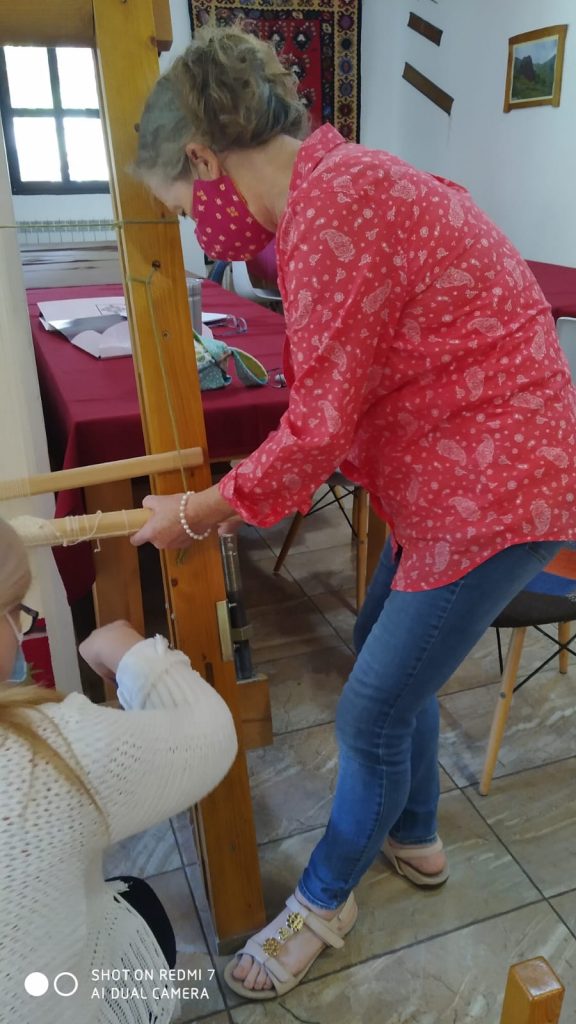
Chatting with Violeta on our way back from one of the media events while we were there, I told her that this was what I had been waiting for. Something that made Serbia more than just about Belgrade for me.
I think I blame COVID. That we have been here for just 10 months, and for 6 of those we have, essentially, been locked into Belgrade. And for most of that time, we have been locked into our (albeit beautiful) home. I took a chance on the colony. I am very risk-averse. My friend knew this and spent a lot of time and energy reassuring me of the precautions they were taking to make this a safe experience for everyone. You can probably see from the photos that they succeeded.
This blog post feels very unsatisfactory, to be honest. It is a bit wandering and scattered.
But at least it is out of my head and out there in the world of pen and paper now. I hope I’ve conveyed something of how important this experience was for me. How much it feels like I not only have my feet on the ground but also my heart in the right place.
